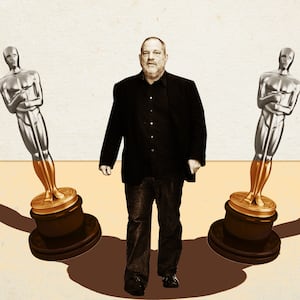Marlow: Oh my, where do we even begin with this garbage fire of an Oscars? As we all know, last year’s telecast was the lowest-rated Academy Awards in 44 years, with just 26.5 million viewers tuning in (it was even bested by an episode of This Is Us, albeit with a Super Bowl-sized lead-in). Much of this is due to cord cutting, and much of it is due to the fact that the Oscars just hasn’t been that great for quite some time.
Kevin: I’m not sure that’s a “fact.” Many people, myself included, thought the 2017 Jimmy Kimmel telecast was great—up to and, frankly, including the delirious pandemonium of the envelope snafu. Ellen DeGeneres’ 2014 ceremony was also fantastic. But I agree that there are certainly major problems, and they’ve become more glaring in recent years.
Marlow: I definitely enjoyed the envelope snafu (and Ryan Gosling’s giggling), but that ceremony was otherwise a snooze! The Ellen one was fun (and popular, attracting almost 44 million viewers) but one knockout hosting performance in a decade-plus of total duds, from Chris Rock to Franco/Hathaway, ain’t gonna cut it. Also the preferential ballot for Best Picture, which the Academy instituted in 2008 in order to recognize more popular films (after The Dark Knight’s infamous snub), has largely backfired, with voters now awarding the night’s big prize to the “least disliked” film of the year (e.g. The Shape of Water). They’re forever chasing the dragon—or in this case, giant ship—that was the 1998 Oscars, the year Titanic took home 11 awards, in what proved to be the highest-rated Academy Awards in history with 57.25 million viewers. So how do ABC and the Academy fix this? Can it be fixed? And should they just stream the damn thing on Netflix?
ADVERTISEMENT
Kevin: I think the biggest problem plaguing the Oscars this last decade is the very idea that it needs to be “fixed,” which has triggered all kinds of bad decisions in reaction to falling ratings. Few of these decisions have telegraphed anything besides panicked insecurity and creative mayhem, nor have they done anything to make the ceremony any buzzier, relevant, or popular. The Academy and this awards show is supposed to represent grandeur.
Marlow: “We all dream in gold!”
Kevin: But instead of asserting itself as the most important night in entertainment, this ratings obsession—hate to break it to everyone: those ratings are never going to get better—has announced an identity crisis that has made the entire ordeal less appealing, to Oscars fans and to would-be casual viewers. I know it may seem like semantics or insufferable nuance, but I think the idea of “fixing” the ceremony has been its downfall; however, there are things about the ceremony in recent years that have and haven’t worked, both as a television special meant to be entertaining and organization supposed to be rewarding an art form. What things do you think have been working well, and what have been disasters?
Marlow: Well, the hosts have been largely unimpressive, which I mostly chalk up to bad writing. And there needs to be more inventive interstitial comedy sketches to break up the doling-out-awards monotony, scripted by the best humor writers out there. One of my favorite recent Oscar sketches was that Judd Apatow-produced bit where Seth Rogen and James Franco, as their Pineapple Express characters, sat on the couch and mocked the year’s nominees, exposing the ridiculousness of “Oscar bait” films like The Reader for all to see (it’s Nazi Kate Winslet fucking a teenage boy!). All these Oscar directors are so goddamn out of touch, though! Throw some money at, say, a Tina Fey or Judd Apatow and cede creative control to them. At the very least fire Glenn Weiss, who was responsible for the last few snooze-worthy Oscars. This ceremony is musty as hell and needs some new, young blood behind the scenes. The success of that Ellen Oscars was in part thanks to its director, Hamish Hamilton, who also helmed the Beyoncé and Lady Gaga Super Bowl halftime shows (and this year’s Maroon 5 one, although he wasn’t working with much there), and producers Neil Meron and Craig Zadan, the team behind Hairspray, Smash, and last year’s awesome Jesus Christ Superstar Live.
Kevin: This is where I think making a directive or mission to change it a certain way is a bad idea. I agree with you that the Rogen-Franco bit was great. But proclamations like the Oscars are old and out of touch sends the Academy on a wild goose chase that, for the isolated cases of actually catching the goose, typically yields cringe-worthy results. (See: Franco and Hathaway, Seth MacFarlane singing about boobs, Neil Patrick Harris in his underwear, Kimmel with a tour bus, or any of the 700 terrible ideas that were floated this year meant to address that problem.) The telecast needs to be entertaining, but that pursuit has diminishing returns. I’ve said it before, but when people are whining the morning after a telecast about the show being boring, they’re not usually citing acceptance speeches or moments that happen at the podium. It’s these unnecessary sketches that are groaned about.
Marlow: But… they are old and out of touch! The fact that Oscar producers/directors and the Academy haven’t reacted to that in a worthwhile way is on them. The awards/speeches are a constant, and the only elements of the ceremony that are out of the producers’ hands. They need to do a better job of updating this TV special and executing these bits. And those bits are a necessary component, adding some gusto to this 4-hour program with a bunch of commercials wedged in (as viewers’ attention spans shrink with each passing year). That scrapped Lonely Island sketch last year was brilliant but Oscar producers didn’t even give it the time of day (Jorma Taccone told me they didn’t even bother considering it) because they are…old and out of touch.
Kevin: That was a bad move. I’m not saying “no sketches!” I’m saying the importance placed on them is misguided. In my opinion, it’s in the awards itself and the films that are being honored where the Academy should be worried about being “out of touch.” Make the changes institutionally that lead to a Black Panther being nominated, or that makes it logical that the talent at the show are ones we want to see. And, as was the case with Rogen and Franco, let them have creative license to showcase what it is about them we like, which, yes, would mean relinquishing some of its monolithic control. But I think the biggest problem with the Oscars has been that recent years have pandered so grossly to this idea that the telecast should be this big ratings grab that it has nearly lost its identity as a ceremony honoring the year in film. There needs to be a host, there needs to be humor, and there needs to be a break from the presentation of awards. But the Oscars are always the most entertaining when it remembers that it’s actually an awards show.
Marlow: Thankfully, there have been some major institutional changes that have played a huge part in getting films like Black Panther and BlacKkKlansman nominated for Best Picture, and the great Spike Lee a long-overdue directing nod. Last year, the Academy invited a record 928 new members to join, with 49 percent of those being women and 38 percent people of color (and 774 members the year before that). There were a total of 6,687 Academy members in 2017 prior to this influx, so they’ve invited about 25 percent of that number in the last two years. But we’ve talked quite a bit about that Ellen Oscars, arguably its last major success. What do you really remember more from those Oscars? Is it the award winners and their speeches? Or is it Ellen giving her all to make the Oscars fun again?
Kevin: I agree that they matter. I disagree that they matter as much as everyone seems to think. Jimmy Kimmel is, on paper, a great host. I think he largely did a good job in 2017. Last year’s telecast was a disaster.
Marlow: On paper, not in practice! But continue.
Kevin: Breaking it down, the worst thing I remember is his tourists sketch and the best thing I remember is Frances McDormand’s speech and call for an inclusion rider. I don’t think that just because Ellen took a selfie once and everyone loved it that it’s an argument for these sketches being the be-all, end-all of a great telecast. (In fact, I’d argue that Lupita Nyong’o’s Cinderella coronation is that ceremony’s more iconic moment, and that the 12 Years a Slave wins did far more to resuscitate the Academy’s reputation than Ellen’s great hosting.) Oscars history, even with how derided the telecasts have become, is filled with memorable moments. I’d venture that 90 percent of them have to do with the awards, not the filler. Every decision the Academy and producers have made this year has been to take attention away from and hurt the integrity of the awards. For an organization so preoccupied with producing a buzzy moment, I feel like that’s the worst thing it could do.








